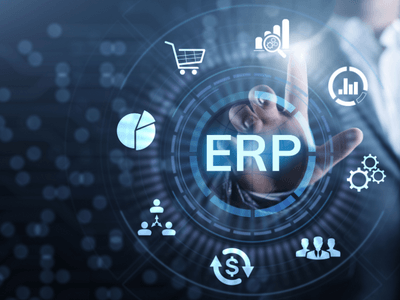So your organization decided to sunset outdated legacy business applications and implement the Oracle NetSuite enterprise resource planning (ERP) system. Before you can roll out NetSuite ERP in full force, you must ensure your data is ready for the new system.
Moving data can be daunting for any size company – small-to-medium-sized businesses with limited IT support or large-to-enterprise companies with a massive amount of data spread across the globe.
For these reasons, it’s essential to work with a reliable and knowledgeable NetSuite implementation and data migration partner like Finlyte.
Finlyte follows ERP data migration best practices, enabling us to simplify the complexity of data transitions. With that in mind, let’s take a closer look at what data migration is all about. We will also discuss the best practices that Finlyte follows to ease the process.
What Is Data Migration?
Data migration refers to the process of moving (or “migrating”) business data from one platform to another. A scenario like yours involves moving your data from your current software application to NetSuite ERP’s database.
It’s likely, though, that you engage in basic forms of data migration regularly. For instance, you have migrated data if you’ve ever sent a file from one system or device to another.
As such, the idea of ERP data migration might seem simple enough, but moving all of your business’s data is far more complex than sharing any single file. Remember, you are dealing with massive amounts of information; not all data is accurate or useful.
Why Is ERP Data Migration So Challenging?
NetSuite ERP is a powerful data migration solution that relies on high-quality, accurate data to function properly. So, one of the biggest challenges associated with ERP data migrations is finding redundant data that must be removed. Imagine your new platform being loaded down with garbage data: How useful can you expect the outputs to be?
Unfortunately, many organizations rely on unalike platforms or old software, which together lead to clusters of identical data being spread across various platforms. Making matters worse is that there are probably differences between each version of the files.
Identifying those distinctions is a considerable task, but the good news is that Finlyte can help you avoid the hassle. Our experienced team understands how to complete the process efficiently by following proven practices in the industry.
4 Essential Data Migration Best Practices
Finlyte can guide your business through the process of moving your data into NetSuite. We will create a strategy that follows these best practices.
1. Prioritize the Migration
Migrating your data is always our top priority. We begin working on doing so from the moment you bring us into the NetSuite implementation project. Our team knows just how labor-heavy and time-consuming these processes can become, and we also know what is at stake.
Simplifying your ERP migration will allow us to shorten your deployment process. It also enables us to decrease your time to value. We proactively identify likely migration back-ups as we perform extensive data mapping, and these maps reveal precisely where your information is located.
Finlyte’s team will also begin forming processes for cleaning the data from all of your systems and creating extraction guidelines.
2. Explore Broader Data Use Cases
NetSuite is an advanced ERP solution. It includes plenty of robust tools and capabilities. As such, it will allow you to use your business data in new ways to bolster productivity and promote efficiency.
However, you will need new rules for translating the information and structuring it; otherwise, you won’t be able to put the data to use. Finlyte handles all of that when overseeing NetSuite implementations. We carefully explore broader use cases for existing data, ensuring you can apply existing information to guide decision-making.
We also offer comprehensive implementation and deployment support to bring your team up to speed on how they can better use your business data.
3. Take Full Responsibility for Data Governance
There are many challenges associated with data migration. One of the most notable involves assigning roles for data control. In other words, you must determine who is liable for which data sets. Your team will also need to decide which version of redundant information is accurate before moving the data to NetSuite.
Finlyte addresses this NetSuite implementation hurdle by taking full responsibility for data governance during migration. We will also help your team adhere to the latest governance regulations to avoid costly fines and other penalties.
4. Be Extremely Selective
If you’re in a hurry to get NetSuite ERP up and running, you may be tempted to migrate all your data. You can sort everything out in the new ecosystem, and who knows, you might need some of that obscure data one day.
In truth, importing all of your data is counter-productive and costly. It can also create numerous headaches once your NetSuite solution goes live. That’s why Finlyte’s migration team is very selective about what data we move to your new ERP platform. We’ll leave it behind if there is no apparent reason why data should be brought over.
Benefits of Following ERP Data Migration Best Practices
Finlyte follows data migration best practices because doing so allows us to better serve our clients. By sticking to set protocols, we can achieve the following objectives for your company.
Streamline Your Transition to NetSuite
Before your company decided to adopt NetSuite, you may have researched other ERP platforms. You probably encountered a few horror stories about other ERP solutions taking a year or longer to implement. But not with NetSuite backed by Finlyte.
Deployment and data migration nightmares are avoidable with the proper system and team supporting the implementation. Finlyte has the expertise, talent, and strategies necessary to provide a seamless transition to NetSuite. Our team follows best practices to proactively avoid delays and shorten the deployment process.
Ensure the Correct Data Is Migrated
When providing our data migration services, Finlyte ensures that useless, unrelated, or inaccurate data is removed during the migration process. Further, we ensure all essential data makes it to your ERP platform.
But ridding your company of necessary data can be just as bad for productivity as bringing over faulty data. That is why we conduct extensive data mapping to identify which information should be moved to NetSuite. As an added layer of protection, we can help you back up older data that is not being migrated in the unlikely event that you need it later.
Prevent Data Loss
Any time data is deleted or unified, there is a risk of data loss. By working with Finlyte, you are reducing the risk of experiencing data loss. Our team takes every precaution necessary to prevent accidental deletions so that all of your vital business data makes it to NetSuite fully intact.
Obtain Training Support
After you shift to NetSuite, the business data may be familiar to your team, but the system certainly is not. How do you soften the learning curve and empower your employees to get the most out of the system? The most straightforward approach is to connect with Finlyte.
In addition to managing your migration process, we provide training support for your team. We can connect you with valuable educational resources to help your team thrive in the NetSuite environment.
Ready to Adopt Leading ERP Software? Finlyte Can Help
Your NetSuite implementation venture hinges on the quality of your ERP data migration strategy. Backed by a sound plan, achieving successful implementation is within reach.
You can partner with Finlyte to streamline data mapping and hand over time-consuming processes to our team. We strictly follow the latest ERP data migration best practices so that you can adopt NetSuite without bearing a frustrating deployment process.
To learn more about our comprehensive implementation process, including complete data migration to your new system, connect with our team to schedule a consultation. We look forward to helping your organization harness the power of NetSuite.







